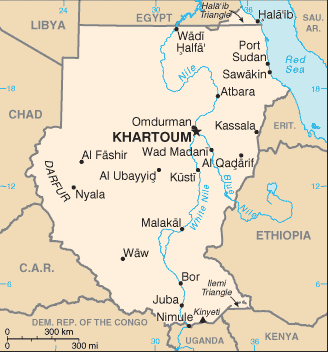| Sudan
Map Courtesy CIA World Factbook
Three Kushite kingdoms called northern Sudan home in ancient times. These kingdoms were influenced by, and in turn influenced Pharaonic Egypt. Although Christianity had been introduced into Sudan in the third or fourth centuries, around AD 640, Islam came to Sudan. A merchant class of Arabs established themselves as economically dominant in feudal Sudan. Important kingdoms in the next 1200 years include Makuria and the Kingdom of Sennar. Religious leader Muhammad ibn Abdalla, the self-proclaimed Mahdi (Messiah), attempted to unify the tribes of western and central Sudan in the 1880s. He led a nationalist revolt culminating in the fall of Khartoum in 1885, in which the British General Gordon was killed. The Mahdist state survived until being overwhelmed by an Anglo-Egyptian force under Lord Kitchener in 1898. Britain ran Sudan as two essentially separate colonies, the south and the north, until 1956. After independence the Arab-led Khartoum government reneged on promises to southerners to create a federal system, which led to a mutiny by southern army officers that sparked 17 years of civil war from 1955 to 1972. Elections were held in April 1965 but Sudan had a series of governments that proved unable either to
agree on a permanent constitution or to cope with problems of factionalism, economic stagnation, and ethnic dissidence. Much of the ethnic conflict is born of the North (Arab, Muslim) versus South (African, Christian and animistic) and has a strong economic element in that economic development while under British colonial rule was focused in the North. Dissatisfaction culminated in a second military coup on 25 May 1969. The coup leader, Col. Gaafar Muhammad Nimeiri, became prime minister, and the new regime abolished parliament and outlawed all political parties. In 1972, the Addis Ababa Agreement led to a cessation of the north-south civil war and a degree of self-rule. This led to a ten-year hiatus in the civil war. In September 1983 President Nimeiri announced his decision to extend Islamic Shari'a punishments into the penal code, re-igniting the civil war. After shortages of fuel and bread, a growing insurgency in the south, drought and famine, in 1984-5 another military coup led by Gen. Suwar al-Dahab restored a civilian government. However the civil war intensified in lethality and the economy continued to deteriorate. In 1989 General Umar al-Bashir became president and chief of state, prime minister and chief of the armed forces. The Criminal Act of 1991 instituted harsh punishments nationwide, including amputations and stoning. The ongoing civil war has displaced more than 4 million southerners. Some fled into southern cities, such as Juba; others trekked as far north as Khartoum and even into Ethiopia, Kenya, Uganda, Egypt, and other neighboring countries. These people were unable to grow food or earn money to feed themselves, and malnutrition and starvation became widespread. The lack of investment in the south resulted as well in what international humanitarian organizations call a "lost generation" who lack educational opportunities, access to basic health care services, and little prospects for productive employment in the small and weak economies of the south or the north. In early 2003 a new rebellion began in the western province of Darfur, during which time the government committed terrible atrocities. In February 2004, the government declared victory over the rebellion but the rebels reported that they remained in control of rural areas and others reports indicated that widespread fighting was continuing. Peace talks between the southern rebels and the government made substantial progress in 2003 and early 2004, although skirmishes in parts of the south were reportedly continuing. The peace was consolidated with the official signing by both sides of the Naivasha treaty on January 9, 2005, pursuant to which the south will be granted autonomy for six years, to be followed by a referendum on independence. It is hoped that the treaty will finally mark the end of a decades-long war that has claimed millions of lives. Now there is peace between the north and the south. However, there is a genocide occuring in the northern region of Sudan. In Darfur, Arab militas by the name of the Janjaweed are raping, killing and attacking non-muslims. Over 10,000 people are killed a month.
|
||||||||||||||||

 The Republic of the Sudan, or Republic of Sudan (in recent years the definite article has increasingly been dropped in common usage) is the largest country in Africa, situated in the northeast part of the continent. The capital is Khartoum. It borders Egypt to the north, the Red Sea to the northeast, Eritrea and Ethiopia to the east, Kenya and Uganda to the southeast, Democratic Republic of the Congo and the Central African Republic to the southwest, Chad to the west, and Libya to the northwest.
The Republic of the Sudan, or Republic of Sudan (in recent years the definite article has increasingly been dropped in common usage) is the largest country in Africa, situated in the northeast part of the continent. The capital is Khartoum. It borders Egypt to the north, the Red Sea to the northeast, Eritrea and Ethiopia to the east, Kenya and Uganda to the southeast, Democratic Republic of the Congo and the Central African Republic to the southwest, Chad to the west, and Libya to the northwest.